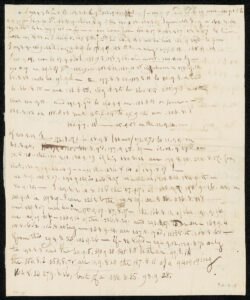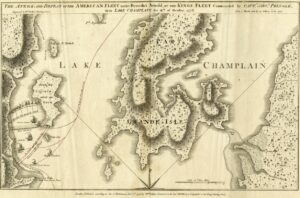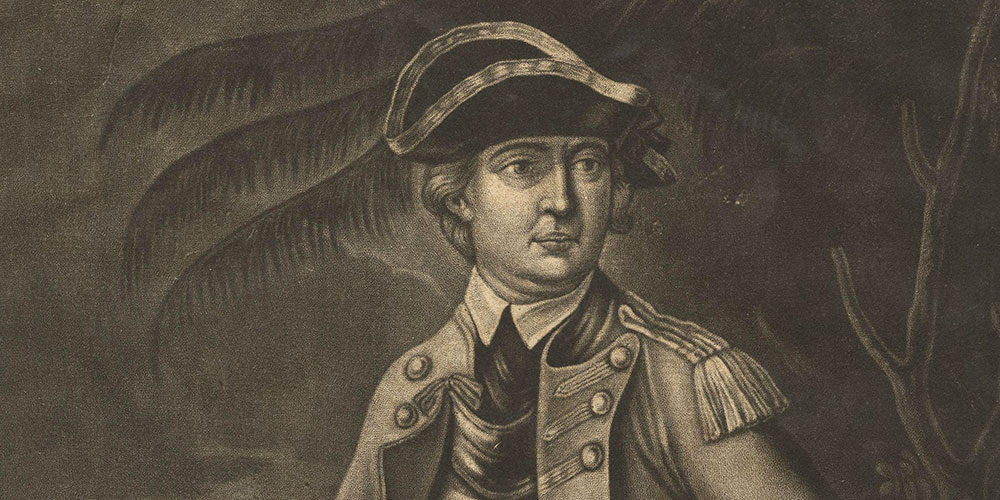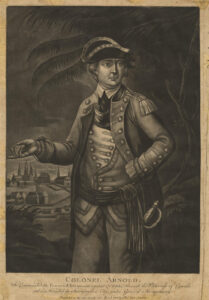The breach
How perplexed Benedict Arnold would have been when confronted with American treason, circa 2021. Imagine the cognitive dissonance when he realized the insurrectionists of Jan. 6 published their plans in advance, and then broadcast their chaotic rebellion in real time. The goals varied widely. Everything happened so fast, seemingly instantaneous.
When Arnold turned coat in 1779, the deed was done under a thick shroud of secrecy at a sloth-like pace. As the Brutus to George Washington’s Caesar, Arnold used complex ciphers and invisible ink in an attempt to sell military secrets to the British. Messages (if they were not intercepted) took weeks to reach their destinations, often crossing in transit. The vilest form of treachery required tremendous patience back in the day.
Motivation

General Arnold engraved for Murray’s History of the American War, ca. 1778. Click the image to enlarge. (William L. Clements Library.)
It’s impossible to know whether Arnold would have cast his lot with the unruly mob who breached the U.S. Capitol this January. Vain and arrogant, Arnold favored precision, clarity, and a clear chain of command, says Cheney Schopieray, curator of manuscripts at U-M’s William L. Clements Library.
Arnold, he says, was arguably the best field commander in George Washington’s Continental Army. “People forget that his heroism preceded his treason, which makes it that much more devastating.”
Schopieray oversees the Sir Henry Clinton Collection at the Clements Library, which contains some of the most damning evidence of Arnold’s chicanery during the earliest days of our nation. Clinton was the British commander-in-chief in America when their relationship was exposed. Arnold was commander of West Point. Their coded exchange seems to secure Arnold’s legacy as the villain of the American Revolution.
“But that seems oversimplified to me,” says Schopieray. “It’s not fair to cast him as a morally bankrupt scoundrel just waiting for the moment to make his true nature known. I think Arnold was a complex human who made a decision that ultimately was on the wrong side of history, with a capital H.”
Smoking gun

172.9.19 [Moore, i.e. Benedict Arnold] letter to John Anderson [John André], July 15, 1780. Click on the image to enlarge. It’s worth it. (Henry Clinton Papers, William L. Clements Library.)
The most significant coded letter in the collection is dated July 15, 1780. The text explicitly names Arnold’s treasonous actions and the terms for those actions. He specifies a price of 10,000 pounds sterling if his actions failed to deliver West Point and 20,000 pounds sterling if the scheme was successful, “a cheap purchase for an object of so much importance.” He also requested a thousand pounds to be paid to his intercessories.
“It makes the hair go up on the back of your neck,” Schopieray says.
“The correspondence is so cold and businesslike that it plays into the picture of Arnold as someone who is completely unapologetic about what he’s doing. It’s like ‘What do I need to provide, and how much is it worth to you?’”
Arnold’s letters with Clinton follow a complex book cipher using the unpaginated Bailey’s Dictionary, 21st Edition (1775). Each correspondent had a copy of the book, which they paginated themselves. Every word was keyed to a three-part code that relayed the dictionary page number, the line of text, and the sequence within the line where the word could be found. Sometimes Arnold would tweak the page numbers by one numeral and alert the messenger to inform the recipient.
For Schopieray, handling the documents at the Clements Library is like stepping into a “a time machine.”
War chest

The attack and defeat of the American fleet under Benedict Arnold, by the King’s fleet upon Lake Champlain, the 11th of October, 1776: From a sketch taken by an officer on the spot. Click to enlarge the image. (William L. Clements Library.)
Library founder and U-M Regent William Clements donated his trove of 18th– and 19th-century American artifacts to U-M in 1920, along with funds to construct a building. He purchased the Clinton Collection in 1925 and it arrived on campus in 1937. It contains 16,500 separate documents, including letters and papers received by British Army Headquarters. More than 360 maps document the early settlement of America and the strategic maneuvers of the British Army. Clinton’s personal war chest also is held at the library.
A key highlight of the collection is, of course, the stream of intelligence reports from British spies posing as part of the Rebel Army, as well as the traitorous letters between Arnold and Clinton. Carl Van Doren, author of The Secret History of the American Revolution (1941) was first to source the material. One of Schopieray’s favorite books on Arnold is 2016’s Valiant Ambition by Nathaniel Philbrick.
In the beginning
Perhaps it is because he was so flawed that we are still talking about Arnold 240 years after his failed attempt at treason.“I’m interested in historical figures that have very human flaws, ordinary people that struggle and make harmful decisions, who strive for goals they don’t reach,” says Schopieray. “I look for [a character’s] humanity; I prefer that to the more the polished heroes — and villains — of history.”
Prior to the war this man with “very human flaws” was an apothecary and merchant. He also indulged in a little smuggling on the side; outwitting the Brits in trade was considered “patriotic” by the Americans.
Arnold was a skilled military strategist but he was passed over for promotion multiple times. He even resigned his commission at one low point, but Washington refused to accept and dispatched him to the Battle of Saratoga where Arnold fought with tremendous valor. But when he still wasn’t recognized, his mood festered along with the leg injury he incurred while defeating General John Burgoyne.
As military commander of Philadelphia in the summer of 1778, Arnold hobnobbed with wealthy Loyalists. From what he could tell, the American cause was suffering, and sentiment seemed to be turning. He married Margaret “Peggy” Shippen in 1779 and his attempts to support his wife’s rich tastes exacerbated his financial distress. All the while, Arnold was embroiled in a legal scandal with the radical Whig Joseph Reed by which only a court-martial could clear his name.
Much-maligned and going broke while he awaited his court date, he wrote a desperate letter to Washington in May 1779 that many scholars cite as a clue to Arnold’s imminent defection: “If your Excellency George Washington, thinks me criminal, for heaven’s sake, let me be immediately tried, and if found guilty, executed. I want no favor. I only ask for justice.”“He sounds frazzled, like a man on the edge — unsure of what he’s going to do next,” Schopieray says. “And within days of that letter, he makes contact with the British.”
Arnold aligned with the British Major John André, a friend of Peggy’s, to open lines of communication with Clinton. His appointment at West Point increased his value exponentially, but it also amplifies his tragic downfall. The military hero-turned-spy was exposed while negotiating its price with Clinton.
In September 1780, André was intercepted by members of the New York militia. Arnold and his wife escaped to England. New scholarship indicates Peggy played a more integral role in her husband’s scheme than previously reported. Arnold went on to hold a command in the British military, but officers often refused to serve under him.





Linda Peck - 1972
This is such an interesting piece, Ms. Holdship. I am not well versed in American History, unfortunately, but at 79 years old one can still take on new subjects for study. I am aware of the William Clements Library and will make a visit one day down the road.
Reply
Tom Gross - 68e, MS 75
The article references Nathaniel Philbrick’s “Valiant Ambition” which I highly recommend. According to Philbrick, the Continental Congress had a rule that only two generals from any state could achieve the highest ranking and Arnold’s state of Connecticut already had two so he could not be promoted despite his stellar accomplishments. Also of note was the fact that generals were expected to provide funds to equip their troops and this put further financial pressure on Arnold.
Reply
Janes Kennan - 1989
Fascinating, thank you for this. The event was depicted in the AMC series “Turn” in an entertaining fashion and I imagine fairly faithfully.
Reply
David Howe - 1964, 1965
An interesting article spoiled only by your obviously left wing introduction. To compare the January 6 events to Arnold’s skulduggery is a real stretch that only taints the rest of the article with an extreme political bias. It’s a shame.
Reply
Lauren Phoenix - 2020
Agreed. It is a total stretch. I would submit that Arnold and the insurgents of January 6th were experiencing similar emotional distresses and repulsion from being silenced, overlooked, and swindled. Sometimes, you have to throw the tea in the harbor.
Reply
David Kurtz - 1973
I’m about as conservative as they come and I will say the headline caught my attention because I thought it might be another left wing hit piece by our favorite leftist University. It’s not. Well written and interesting. Ms. Holdship even acknowledged that the Jan. 6 so-called “insurrection” was planned in advance, thus relieving President Trump of some of the more excessive accusations that the press made. With that said, it is annoying to be comparing Jan. 6 to delivering West Point to the British.
Reply
Jeffrey Kushner - So called insurrection”1977
Trump is not a conservative. He is an opportunist who has no political philosophy. To claim because there was preplanning prior to the insurrection on January 6 that Trump is absolved of any responsibility is ridiculous. 4 years of demonizing the “deep state” and 2 months of promoting the “Big Lie” that the election result was fraudulent set the stage for the events of January 6. His goal on January 6 was to overturn the result of the election and he threw the match that ignited the uprising. A coordinated attempt supported by the POTUS to to overrun and murder members of congress with the goal of overturning a free and fair election is a “so called” insurrection?
Reply
Stephen Charles - 1979
Trump’s political philosophy is tied to business normative in the early 1980’s. He eschewed regulations, knew the importance of a heathy and robust manufacturing industry, and supported this country above all others. That he was a meglomaniac and narcissist is less important than the economic and foreign policy results of this administration. Neglecting the wholesale attempt by the Dems and deep state to reject his election in 2016, thwart his administration at every opportunity with illegal wiretapping, fake investigations, fake impeachments, etc. is denying reality.
Reply
Rick Pacynski - 1975, 1979
Is our country so divided that a mob attacking the Capitol, breaking through the doors, killing or beating police officers, is not universally considered “treasonous”? The woe be our future. Shame on you. Shame on you for claiming the use of the term under these circumstances was a “left wing introduction.” I have no doubt that Officer Sicknick, were he alive, would be highly offended by your apparent view that his death was less than a treasonous act.
Reply
elliot shifman - M.H.A. 1972
Whoa! Let’s be clear. Is the “…obviously left wing introduction” you cite because of the descriptor “treasonous” in the introductory paragraph, regarding the event on Jan 6? And you object to the accuracy of the descriptor? Even if you think the insurrection appropriate, it was clearly “treasonous” towards the United States of America. Further, that it was clearly an event and activity at the behest of a proven traitorous President, making the descriptor even more accurate. And btw, “left wing” does not carry a completely negative connotation among those with an objective mind.
Reply
John Peters - 1980
The comparison was regarding the speed of today, and the open nature of the planning today. It was a well done, interesting article, with a good “hook”.
Reply
Garry Post - 1976
Thank you for composing this brief and entertaining review of the downfall of Benedict Arnold and the contrast with the recent attack on the US capital. Well done.
Reply
Lionel Whiston - MBA 1971
An excellent article! Thank you also for the outstanding quality of the publication you lead. I truly enjoy and appreciate it.
Reply
Stephen Charles - 1979
While a study of Benedict Arnold is worthy in its own right, trying to create a link between he and the events of January 6th is irrational. BA was consumed by personal gain and ended up siding with the loyalists. The events of January 6th 2021 still have not been fully elucidated. There is evidence that the violence was planned, included leftists as well as Trump supporters, and the timeline indicates that it preceded the President’s speech. While I condemn the violence which occurred that day, why hasn’t there been any attention paid to the long term incitement by democrats from Maxine Waters who exclaimed in 2018, “get into their faces…” or Kamala Harris who advocated street violence and in fact raised bail money for the rioters who looted, burned, and murdered Americans across the continent? The violence in America’s cities is ongoing, financed by dark money, perpetrated by antifa, and is largely ignored by academics, the media, and Congress alike.
Reply
elliot shifman - 1972
Get a clue! There is no evidence that anyone with a “leftist” leaning attended the Jan 6 event. Waters’s and Harris’s alleged incitements were obviously not directed at overthrowing the U.S. And you can’t prove despite your imagination that there’s any support for violence in American cities by “dark money, perpetrated by antifa.” No less than the FBi has looked into your empty b.s. allegations and found nothing.
Reply
Stephen Charles - 1979
Are you referring to the FBI, which was complicit in the fake Russian hoax narrative? For nearly a year, the FBI has not been able to arrest anyone who attacked federal buildings across the nation carrying the banner of antifa, have beat up and murdered dozens, set up autonomous and violent “free zones”, and yet they were able to identify and arrest the Capitol protestors within hours. Ironically, none of the leftist terrorists who torched the St. Joh’s Episcopal church across the street from the WH have been prosecuted. The FBI is one instrument of the deep state and cannot be regarded as free of political bias.
To your point regarding arrests of leftists at the Capitol protest, I would point you to the arrests of John Sullivan, prominent BLF activist as well as Aaron Mostofsky. If you did some research rather than take the “blue pill” from CNN, perhaps you could be enlightened?
Reply
Wendy Smith - 1973
Regarding the claim that “For nearly a year, the FBI has not been able to arrest anyone who attacked federal buildings across the nation carrying the banner of antifa” the first click of a simple Google search revealed this information about the Portland, OR protest/riot:
“Federal prosecutors have brought more serious felony charges against those they say engaged in the violence — 20 cases as of late last week, according to NPR’s review of the court papers.
Those are primarily either assault of a federal officer or arson charges. One defendant, for example, is accused of hitting a deputy U.S. marshal with a hammer, while another allegedly struck a deputy U.S. marshal with a baseball bat.” September 5, 2020
https://www.npr.org/2020/09/05/909245646/review-of-federal-charges-in-portland-unrest-show-most-are-misdemeanors
The entitled, arrogant January 6th insurrectionists and their selfie videos remain, at least for me, almost unbelievable. What kind of person films themselves committing a crime, and posts it for all the world to see? “Look at me, Ma!” At least they made the FBI’s job infinitely easier.
Reply
Lee Frame - 1961
Interesting and informative article. Too bad it becomes a vehicle for more partisan bickering.
Reply
John Peters - 1980
Agreed.
Reply
Frank Spies - BBA61 JD64
Great article except for the first paragraph. I am proud to be a UofM graduate, but the liberal slant to everything really upsets me. Good comments by Howe, Phoenix, Charles.
Reply
DOUGLAS GRIFFIN - 67
The comparison of Arnold to the Jan 6 rioters is wholly inappropriate. I would run it by the history department, not the communications or public affairs office. As an amateur historian and political junkie for 50 years, I submit there is a big difference between treason and insurrection, especially in this case. The insurrectionists acted in misguided belief in the righteousness of their cause. While, the traitor turns against those in his own cause and betrays them because of personal anger, change in thinking, or feelings of personal betrayal (revenge). Arnold felt betrayed and unappreciated by Washington and those in power in the Continental Army and Continental Congress. He asked for a few pieces of silver and the chance to lead an army against the Continentals to show his military “talent,” which he felt had been ignored. His cause was the satisfaction of his own ego. Nothing more.
Reply
Deborah Holdship
I agree with you, Doug. I was contrasting, not comparing, Arnold and the mob who breached the Capitol.
Reply
Hank Amon - L1968
Spies sums it up. Thanks in particular to Charles for tossing inconvenient facts Shifman’s way.
Reply
Deborah Holdship
When you get tired of the direction this conversation is taking, I highly recommend this online exhibit at the Clements Library: “Spy Letters of the American Revolution” — https://clements.umich.edu/exhibit/spy-letters-of-the-american-revolution/
Reply
Gary Barber - 1968
In other words when you don’t like the pushback from your readers just shut down the conversation. A more appropriate way to have handled this was to have never made the article a political statement and instead just reported the factual information with a recommendation to follow up at the Clements library. Why does every “journalist” feel they have to include an editorial in each piece they write?
Reply
Deborah Holdship
Gary, keep pushing back and arguing all you want. It’s so much more rewarding than learning something new. The spy letters are really cool.
Reply
Bob Syrunkel - 1982
Merriam-Webster definitions:
treason = the offense of attempting by overt acts to overthrow the government of the state to which the offender owes allegiance
insurrection = an act or instance of revolting against civil authority or an established government
The terminology issues raised in the comments here are mainly that Jan 6th was insurrection and not treason. The difference based on those definitions is whether it went beyond a revolt to an attempt to overthrow the government. Trying to replace the national election results with an outcome different than what the individual states reported can definitely be considered an attempt to overthrow the government.
But those definitions are unlikely to change anyone’s mind, so instead I’ll say that the page about Spy Letters looks very interesting.
Reply